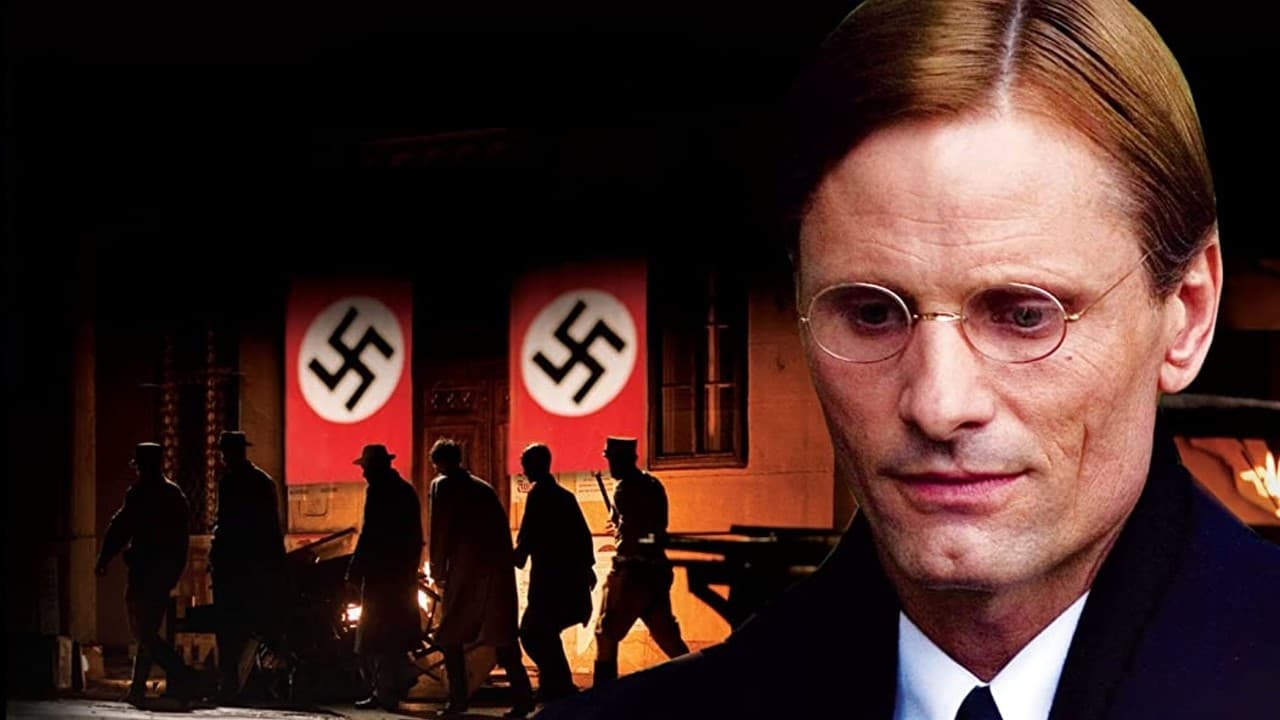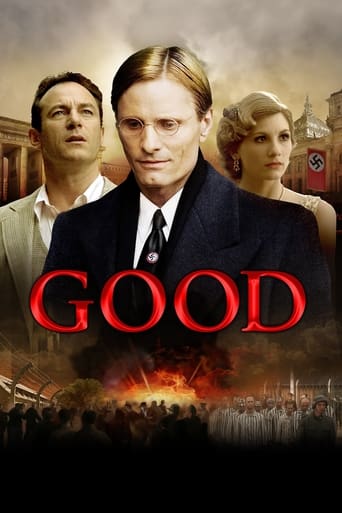Linbeymusol
Wonderful character development!
RyothChatty
ridiculous rating
Nonureva
Really Surprised!
WillSushyMedia
This movie was so-so. It had it's moments, but wasn't the greatest.
tomsview
"Good" starts quietly, but ends powerfully. It goes to the heart of our sense of right and wrong.The movie is set in Germany a few years before WW2. John Halder (Viggo Mortenson) is a WW1 veteran and university lecturer who lives in a small apartment with his wife, two children and a demanding, invalid mother.He has written a novel about euthanasia, which the new Nazi government finds is in accord with their ideas, and John is offered a post within the SS. Although he is anything but a Nazi, John nonetheless enjoys the advantages the position offers him although it compromises his relationship with his friend, Maurice Glückstein (Jason Isaacs), a Jew.John also leaves his wife and marries a sexy young student, Anne (Jodie Whittaker); he is a man who seems easily seduced in love and in life. Eventually, in the film's grim finale, John is forced to confront his lack of firmness and the realities of the Nazi regime.The story shows in microcosm how the Nazis seduced the Germans, and how they accepted the loss of personal freedoms and worse for what seemed to be for the good of the nation, a better life, and maybe, just not to rock the boat. However, there was a price to pay and once ensnared there was no turning back.The film probably has more relevance to people who know some history of the times, because it helps explain why John acts the way he does - although not stated overtly, his actions are driven by underlying fear. There are little touches that the filmmakers don't feel necessary to explain such as why the previous occupants of Anne and John's new apartment have left so suddenly - a knowledge of the times would suggest that they were Jews who had been evicted.Some scenes are painful to watch, especially as John fails to help Maurice as the Nazis ramp up their persecution of the Jews. Here, the film seems to challenge the viewer, "What would you do in his place"? Would you have the courage to swim against the tide of events? John is basically a decent man, however he is too pliable, too apathetic, and does not act until it is too late."Good" may seem slow to some, "Iron Man 2" it is not. But I feel that the time it takes to build its characters pays off in the end - we become involved. One of the most asked questions in history is how did the Nazis manage to sway ordinary Germans to their cause? This film gives part of the answer in an intimate and accessible way. As British philosopher Edmund Burke famously said, " The only thing necessary for the triumph of evil is for good men to do nothing".
jared-rulz19
****SPOILERS****Let me start this off by saying that the performances by Viggo Mortenson and Jason Issacs are fantastic. They really hold up and kept me engaged into what was going to happen next. Yet the movie is very slow so if you arn't prepared for anything with a deep meaning and a period piece you may be sadly disappointed. Let's start with camera work, it's beautiful yet there are some odd editing issues in between but other than that it was pleasing. Now to the story. The biggest problem with it is that nothing is resolved except for John's mother dies or ESPECIALLY when John is looking for Maurice at the camp it just left wondering what the whole point of the last two hours was that I watched.All in all this movie was great with fantastic performances and great camera work but with a story that's mildly confusing at times it'll just kind of leave you hanging.
sol1218
***SPOILERS*** Excellent if a bit talky movie about life in pre WWII Nazi Germany with German Literature professor John Halder, Viggo Mortensen, being swept up with the violence of the Nazi movement in order to improve his position in life and at the same time losing his humanity for his fellow human beings in the process. Called over to the German Chancellory for an interview on his book about euthanasia or mercy killing John is both shocked and impressed to find out that the Fuhrer Adolph Hitler himself was greatly moved by it and wants him to become a high ranking official in the Nazi Party which in fact John isn't a member of.As John is moving up in the world or Nazi Germany his personal life is quickly falling apart. John start's to have an affair with one of his students Anna, Jodie Whittaker, that ends up destroying his marriage. There's also John's best friend psychologist and WWI army buddy Maurice Gluckstein, Jason Isaacs, who just happens to be Jewish. It's John refusing to distance himself from Maurice that causes him all kinds of problems with his Nazi superiors. As for John's mom, Gemma Jones, her losing her mind and becoming suicidal is the reason that he got interested in the subject of mercy killing in the first place! That in order to put her out of her misery, with the help of the German or Nazi Government, before she ends up doing it herself!It's when minor German diplomat Ernst Vom Rath was gunned down by deported, by the Nazis, German Jew Hershel Grynszpan in Paris that John finally came to his senses in what was to become known as the notorious "Kristallnach" or "Night of Broken Glass". That's when in revenge to Vom Rath's murder tens of thousands of German hooligans with the German police looking the other way went on a 24 hour rampage ending up killing some 100 Jews in both Germany & Austria. What was so ironic about all this is that Vom Rath was in fact at the time being investigated by the Nazi Gestapo for his anti Nazi feelings among which was their brutal treatment of the Jews in Germany! ***SPOILERS*** With Maurice arrested and sent, with 30,000 other German Jews, to the nearest concentration camp John was now determined to track him down and , if he's still alive, save his friend's life. That all ends in disaster some four years later when John finds Maurice near death with his mind completely gone as he and hundreds of other concentration camp inmates are being rounded up and sent to their deaths because their no longer any use to the Nazi war effort. Ironically the concentration camp commander in charge of the round up as mass killing was non other then the notorious Nazi war criminal Adolph Eichmann played by Steven Elder.The film showed how difficult it was for an average German to remained a normal human being in Nazi Germany without being effected with its raciest and political ideology. A situation which even turned a good kind and decent man like John Halder into a robot like following orders from his superiors by the books zombie!
MrGKB
...as onomatopoeic as it could have been, "Good" boasts a motivated, talented cast (Viggo "The Road" Mortensen, Jason "Harry Potter..." Isaacs, Gemma "ditto..." Jones, and Mark "Kick-Ass" Strong, among others), some nice lensing by Andrew "Precious" Dunn, and all-round quality production values, but in the end, the script by an industry tyro fails to live up to or expand upon the source material: Brit playwright C. P. Taylor's brilliant 1981 stage play. In a nutshell, "Good" limns the tragic descent into the "banality of evil" of a pre-WWII German literature professor who is drawn into the cruel orbit of Nazism (and specifically the SS) and ultimately betrays everyone near and dear to him, all the while rationalizing that he is only a "good" man doing the "right" thing. Taylor's script is brilliant, engaging, horrifying and emotionally stunning. This film version is not. It does its best to capture the heart of the play, but fails to illuminate its soul.Partly the failure is due to the traditional cinematic approach, and the inevitable distance it creates with its audience. In the play, the main character, John Halder (Mortensen), continually breaks the fourth wall, speaking directly to his audience, a tactic that film is only rarely able to justify dramatically, and even more rarely pull off with any success (take a moment; try to think of how many movies you've seen where that sort of thing works. Can't think of too many, can you?) Nonetheless, it's somewhat of a change of pace from more conventional movies about the Holocaust, in that it focuses on the human nature of the instigators rather than the victims, and as far as that goes is worth a watch, but if you ever get the chance, go see a production of the play (should you be so lucky to have the opportunity); it's miles ahead of this well-intentioned but unsatisfying film (I've given it a five instead of the six I would have otherwise awarded it for that specific reason). You'll be glad you did.

